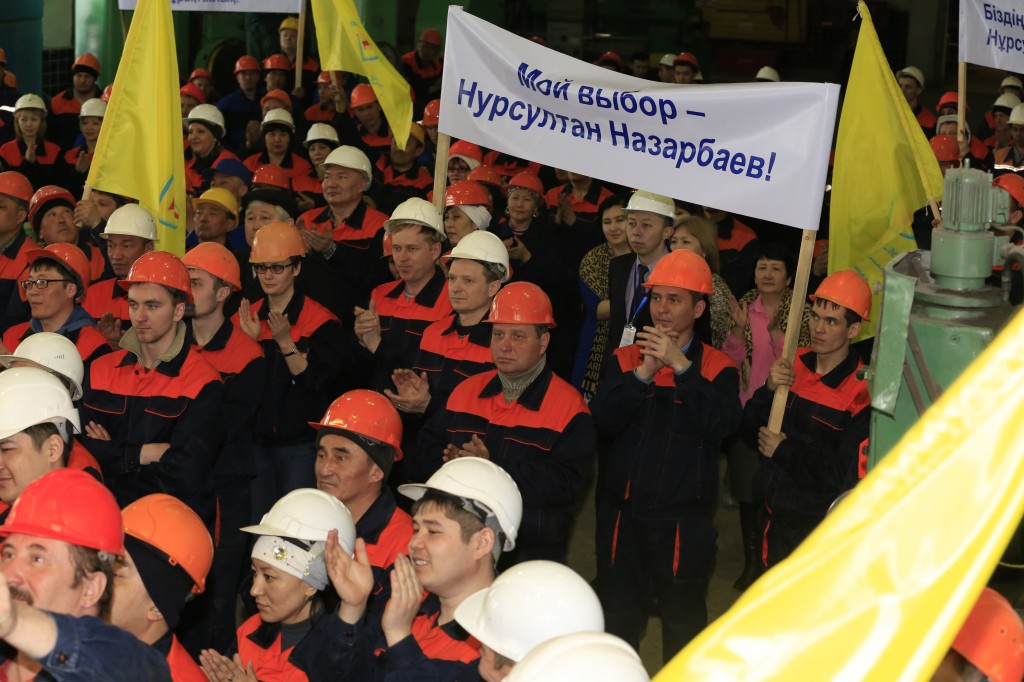ASTANA – Incumbent President Nursultan Nazarbayev presented his platform for the April 26 early presidential election published by his campaign in an article carried by the Kazakhstanskaya Pravda on March 31.
“Over the years of independence, Kazakhstan had to cover a great way. The country joined the top 50 most-competitive countries of the world. By 2014, our country’ sGDP increased 20 times and reached $13,000 per capita. Kazakhstan has become a leader of the Commonwealth of Independent States (CIS) for a favourable investment climate and has attracted more than $200 billion in foreign direct investment. The people’s welfare increase is ensured. The average monthly salary increased 27 times; the income of the citizens increased 12 times. Life expectancy of citizens increased to 70.4 years, while maternal and infant mortality rates reduced significantly. We entered the twenty-first century as a dignified and respected country, as well as a reliable and stable partner for the whole world,” the platform stated.
“The world is going through difficult times. The collapse of world market prices for energy and metals sharply increased global and regional economic risks. The negative impact is felt in the economies of almost all countries of the world. Kazakhstan is no exception. The military political situation in the world is full of dangerous new threats. International terrorism raised its head; interfaith relations became complicated in many parts of the world. In the global perspective, especially in Europe, there is a growing distrust between the world powers because of the new sources of conflicts and a number of unresolved security issues,” the document said.
In such a difficult world situation Kazakhstan developed the timely Nurly Zhol economic stimulus package, which includes measures to counter the global crisis under the state programme of infrastructure development, as well as the continuation of the industrialisation course in the second five-year plan, the platform continued.
The platform also means Nazarbayev will also be promoting the Kazakhstan 2050 Strategy, which aims to raise the nation to join the world’s 30 most-developed countries by 2050 and contains programmes to promote the development of key economic sectors.
For the successful achievement of Nurly Zhol and Kazakhstan 2050 Strategy, Nazarbayev put forward five institutional reforms in his campaign.
The first change, a modern state for all, is oriented to make a civil service corps autonomous from current political processes and protectionism of individual persons. The reform stresses elimination of corruption in state bodies. Nazarbayev has suggested the introduction of a new system of remuneration for civil servants in accordance with their contribution to the management process. The modification would also provide bonus payments for political and administrative servants depending on their performance and annual achievements in the economy.
“Meritocracy should become a universal principle not only for the government, but also for the entire civil sector, including national companies and holdings,” Nazarbayev suggested.
The second reform, the rule of law, points out that Kazakh justice and law enforcement systems must safeguard the interests of private property and the rights and freedoms of citizens. The reform suggests introducing a new system of professional and psychological selection of police officers and ensuring regular promotion and confirmation of their qualifications. The change would also stiffen qualification requirements for judges.
The third reform, stable economy, is a set of economic modifications to accelerate the formation of the middle class. Nazarbayev has suggested an industrialisation programme aimed at job creation and development of Kazakhstan’s export potential. In the short run, its key challenge is to prevent a sharp failure in the dynamics of economic development. As a result of the work on diversifying the economy, three or four new export products must emerge. The change also stresses development of the agricultural products processing sector, as well as supports small and medium-sized enterprises.
The fourth reform, a nation of the united future, proposes development of the trinity of languages – Kazakh, Russian and English, as a key to consolidating the society and growing its competitiveness. According to the plan, the idea of Mangilik El, should serve as a system of common civil values, written in a constitutional act.
The fifth reform, transparent and accountable government, includes institutional modifications in the public administration and economic development sector. Nazarbayev noted the viability of considering the reforms by the 4 + 1 formula, which is comprised of four sub points. Firstis the necessity to expand the accountability of the heads of state bodies, followed by ensuring the transparency of decisionmaking through the mechanism of open government. The two points would help to ensure active involvement of citizens in the decision making process of higher state bodies. The third reform would introduce civil budgeting, which would mean the people’s participation in budget allocation in the regions.The fourth change would create a system of administrative justice, while the last would ensure a widespread introduction of societal self-regulation by transferring powers to the civil society institutions and reducing the areas of responsibility for state bodies.
“Thus, each of the five institutional reforms is a huge challenge for the country. It is hard work, requiring financial costs and professional management. The success of such reforms can only be achieved with a strong will of government and people. Proposed measures will radically change the system of social relations,” said Nazarbayev.
The incumbent proposed establishing a national commission on modernisation under the President in order to carry out and coordinate these reforms.



